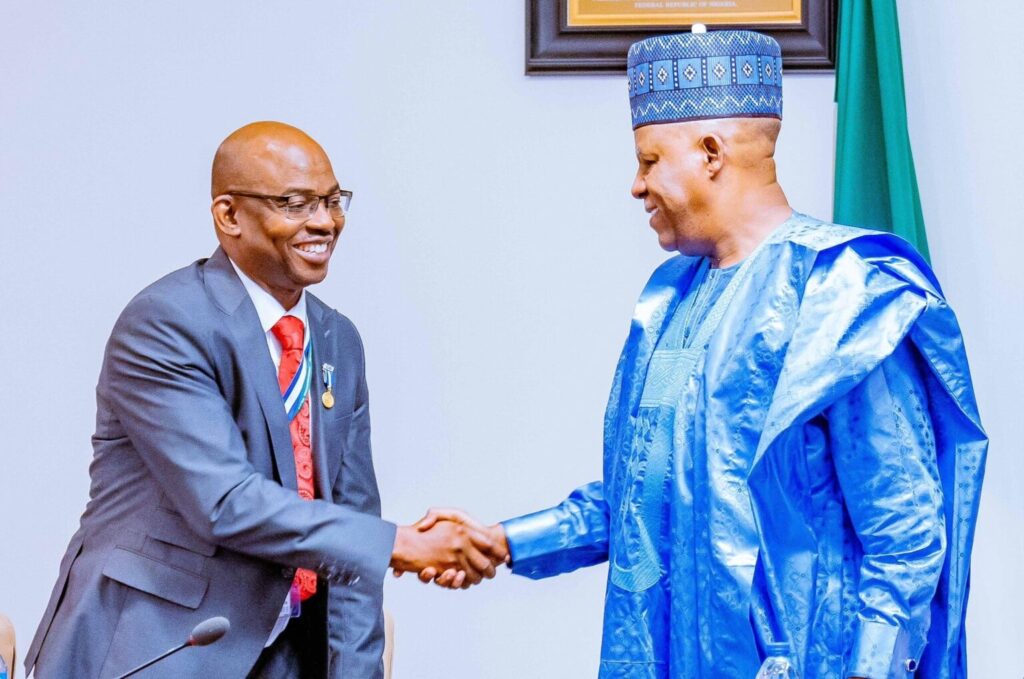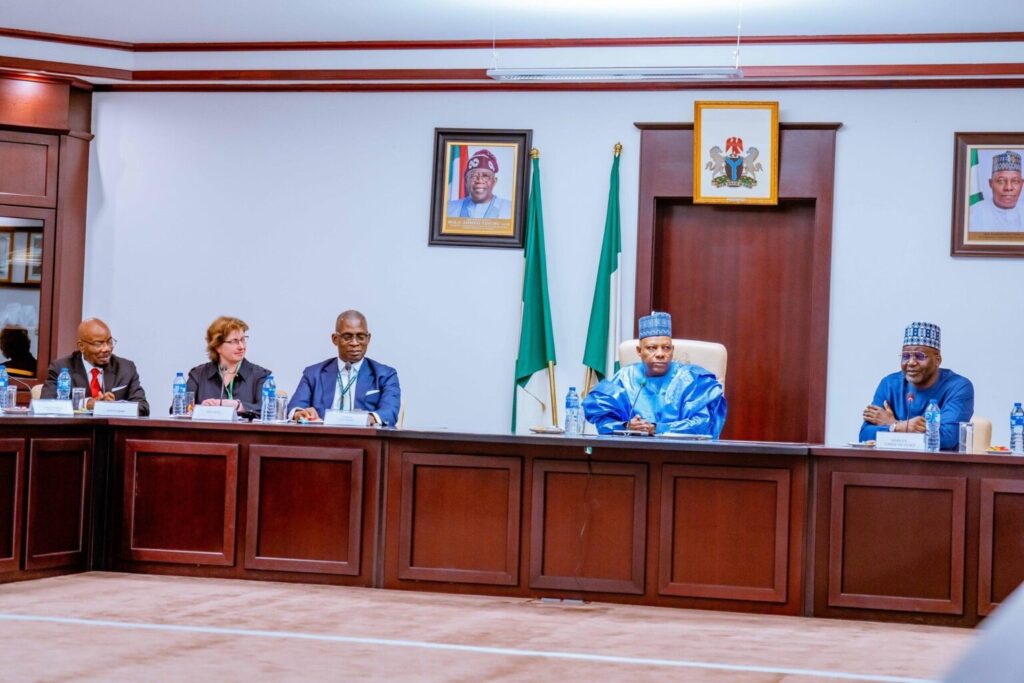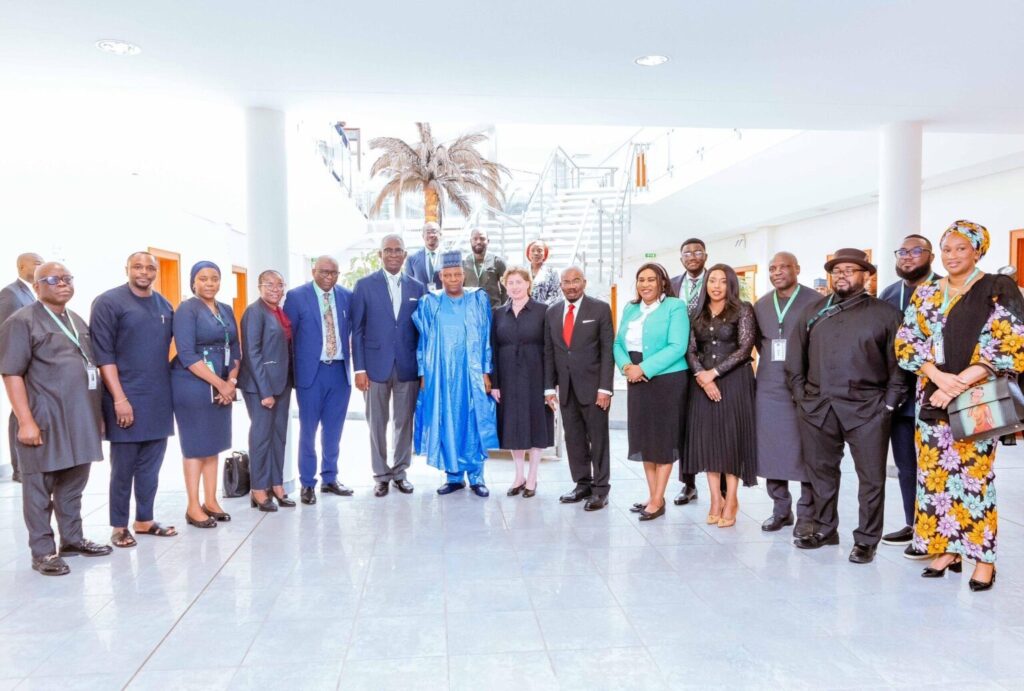The Vice President Kashim Shettima has articulated a vision for Nigeria’s future under President Bola Ahmed Tinubu’s administration. Addressing delegations from both the Commonwealth Enterprise Investment Council (CWEIC) and the Institute of Chartered Accountants of Nigeria (ICAN), Shettima emphasized the government’s commitment to transformative economic policies that are expected to position Nigeria as a significant global economic force.
Strategic Engagement with CWEIC
During a meeting with CWEIC, led by CEO Rosie Glazerbrook, Vice President Shettima highlighted the Tinubu administration’s focus on harnessing the demographic dividends of Nigeria’s youthful population through enhancements in digital technology, electricity supply, and production capacities. This meeting underscored Nigeria’s readiness to attract global business investments, with Shettima asserting that the country is primed for significant economic activities facilitated by a pro-business government.

The Vice President expressed confidence that by 2050, when Nigeria is projected to be the third most populous country globally, it will also emerge as a major economic player. This optimistic forecast is supported by recent projections from an investment bank, which predicts that Nigeria’s economy could rank as the third largest globally by 2075.
Commitment to Modernizing Regulatory Frameworks
Shettima also reassured ICAN that the executive branch would collaborate with the National Assembly to update the Institute’s enabling Act of 1965, aligning it with contemporary global standards and best practices. This move is part of broader efforts to modernize Nigeria’s regulatory frameworks to support professional growth and ensure that governance structures meet current international norms.
ICAN’s Role in National Development
Responding to the needs of ICAN, represented by its President, Dr. Innocent Okwuosa, Shettima acknowledged the institute’s critical role in shaping Nigeria’s economic policies and its non-partisan stance on national issues. The Vice President praised ICAN’s contributions and confirmed his participation in their upcoming conference in Abuja, signaling strong ongoing support for their initiatives.

Supporting Bold Economic Reforms
The Vice President lauded the bold reforms initiated by President Tinubu, including the controversial fuel subsidy removal and the unification of foreign exchange rates. These actions reflect the administration’s commitment to the Renewed Hope Agenda, aiming to stabilize and stimulate the nation’s economy.
CWEIC’s Support and Future Collaborations
Rosie Glazerbrook of CWEIC pledged ongoing support for Nigeria, highlighting planned events like the Commonwealth Trade and Investment Forum in London and a similar forum in Nigeria, set for the second half of 2025. These events are designed to foster deeper international trade relationships and attract investment, enhancing Nigeria’s role in the global market.
Strengthening International and Domestic Partnerships
Vice President Shettima’s proactive approach extends beyond immediate economic policies to nurturing robust international and domestic partnerships. These alliances are crucial for Nigeria’s integration into global markets and for fostering sustainable economic growth domestically. The engagements with organizations like CWEIC highlight Nigeria’s commitment to leveraging international cooperation to enhance its economic stature.
Enhancing Economic Diversification
One of the key strategies under President Tinubu’s administration, as highlighted by Vice President Shettima, is economic diversification. Nigeria has historically been reliant on oil revenues, but the current administration aims to broaden its economic base by promoting sectors like technology, agriculture, and manufacturing. This diversification is not only vital for reducing economic vulnerability to global oil price fluctuations but also for creating employment opportunities for its burgeoning youth population.

Focus on Technology and Innovation
Emphasizing the role of digital technology in driving economic growth, the administration plans to capitalize on its young, tech-savvy population to spearhead innovations. By improving the digital infrastructure and fostering a conducive environment for tech startups, the government aims to position Nigeria as a leader in technology-driven sectors. This focus is expected to spur significant advancements in fintech, agritech, and healthtech, drawing both local and international investments.
Addressing Infrastructure Challenges
Acknowledging that robust infrastructure is the backbone of economic development, the government has prioritized upgrading Nigeria’s electricity supply and transportation networks. These improvements are essential for attracting foreign investment and supporting local businesses. Reliable power and efficient logistics are critical for operational success in manufacturing and other industries, directly impacting economic productivity.
Promoting Good Governance and Transparency
To solidify investor confidence and ensure sustainable development, the Tinubu administration is also committed to upholding principles of good governance and transparency. These principles are crucial for combating corruption, which has historically undermined Nigeria’s economic potential. By implementing strict regulatory measures and ensuring transparency in governmental operations, the administration seeks to create a more accountable and efficient government.
Future Outlook
As Nigeria gears up for a transformative phase under President Tinubu’s leadership, the global community and potential investors are watching closely. The strategic initiatives and reforms introduced are designed to propel Nigeria towards becoming a significant global economic force. If successful, these efforts will not only elevate Nigeria’s status internationally but will also improve the quality of life for its citizens through enhanced economic opportunities and social development.
Conclusion
Vice President Shettima’s recent assurances and the strategic directions outlined underscore a pivotal era for Nigeria. With a focus on leveraging demographic dividends, enhancing infrastructure, promoting diversification, and ensuring governance reforms, Nigeria is on a path that could redefine its economic landscape and its role on the global stage. The collaboration with international bodies like CWEIC and the support for domestic institutions such as ICAN are indicative of a holistic approach to achieving these ambitious goals.



